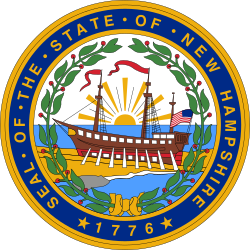| |||||||||||||||||||||
| |||||||||||||||||||||
 County results Morril: 40–50% 50–60% 60–70% Woodbury: 50–60% 60–70% | |||||||||||||||||||||
| |||||||||||||||||||||
| Elections in New Hampshire |
|---|
 |
The 1824 New Hampshire gubernatorial election was held on March 9, 1824, in order to elect the governor of New Hampshire. Former Democratic-Republican United States senator from New Hampshire David L. Morril defeated incumbent Democratic-Republican governor Levi Woodbury and former Federalist governor Jeremiah Smith. Since no candidate received a majority in the popular vote, Morril was elected by the New Hampshire General Court per the state constitution. [1]


